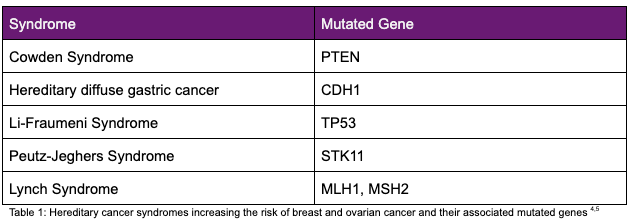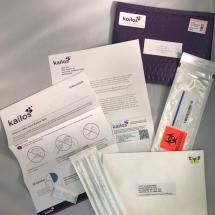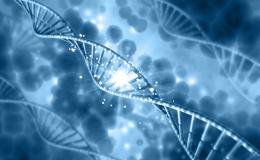Assess Hereditary Cancer Risk with Genetic Screening
A young woman, new to your practice, is in for a routine physical. Her family history of cancer includes her mother, who was diagnosed with breast cancer at age 45, and her maternal grandmother, who was diagnosed with ovarian cancer. While positive cancer diagnoses in both a mother and maternal grandmother do not necessarily indicate the presence of hereditary cancer, several hereditary cancer syndromes are known to increase the risk of both breast and ovarian cancers. With this knowledge, you order comprehensive hereditary cancer genetic testing to determine if there is a gene mutation responsible for the family’s cancer history. The genetic testing panel reveals the patient is negative for the most common breast cancer-causing gene mutations, such as those present in BRCA1 and BRCA2, and instead detects a pathogenic mutation in the RAD51 (RAD51 recombinase) gene.

The RAD51 gene encodes a protein that is used in the first step of DNA repair. In normal settings, the activity of this protein is regulated by BRCA2, which transports RAD51 to the site of DNA repair. Research indicates BRCA1 may play a similar transport role with RAD51, although the role of BRCA1 is less clear.1 While it is well established that mutations in BRCA1 and BRCA2 likely increase the risk of breast and ovarian cancer because of their integral role in DNA repair, the exact role of RAD51 in both breast and ovarian cancer is not well understood. Given that RAD51 is transported by BRCA2 and/or BRCA1 to function in DNA repair, however, it is reasonable to assume that a mutation in RAD51 may lead to an increased risk in similar cancers. In fact, current literature supports that germline mutations in RAD51 may increase the risk of ovarian cancer.2 The literature on breast cancer risk from RAD51 mutations is less clear, however, some data suggests that mutations in RAD51 may confer an increased risk of breast cancer.3
An increased risk of breast and ovarian cancer is observed in additional inherited cancer syndromes beyond Hereditary Breast and Ovarian Cancer Syndrome (HBOC), caused by BRCA1 and BRCA2 mutations. The genes that are mutated in some of the syndromes associated with an increased risk of breast and ovarian cancer are shown in the table below:

Our case study underscores the utility of hereditary cancer screening to better assess disease risk and ultimately save lives. Kailos Genetics’ ExpedioTM hereditary cancer screening test provides you with actionable information regarding your patient’s genetics, enabling you to take proactive screening and preventative measures that may significantly impact your patient’s future quality of life. The Expedio hereditary cancer screening test utilizes next generation sequencing technology to screen mutation-prone regions in 33 different genes to identify deleterious mutations that may increase a patient’s cancer risk.

We extract patient DNA from buccal cells collected at the clinic or the patient’s home, making sample collection simple, quick and painless. Results of the patient’s hereditary cancer screening test are delivered in as little as two weeks. At Kailos, we understand the power of personalized medicine.




